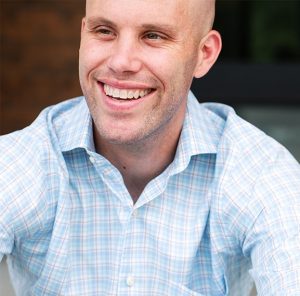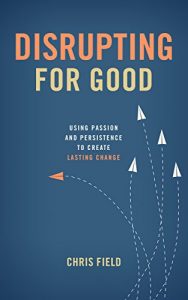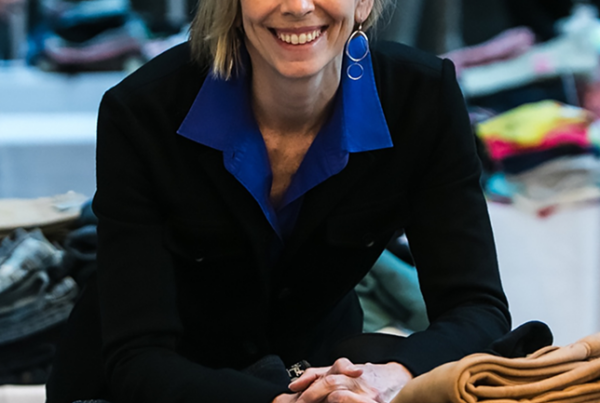Podcast: Play in new window | Download
Subscribe: RSS
How Do You Bring About The Positive Change That You Want?

Chris Field
Chris Field has been challenging complacency and disrupting the status quo most of his life. His most important disruption is Mercy Project, the non-profit he started to rescue children from human trafficking in Ghana, Africa. Its innovative approach has drawn international attention and earned the prestigious Norman Borlaug Humanitarian Award.
To date, Mercy Project has rescued 170 children, returned them to their families, and provided them with education that will transform their future for generations to come. Chris lives in College Station, Texas with his wife Stacey and their four young children.
Chris Field is the author of the book, Disrupting for Good.
What We Discuss With Chris Field In This Episode
- How Chris became a disruptor
- The birth of Mercy Project
- How their organization is bringing families out of poverty
- Solving the problem forever instead of just putting a bandaid on it
- The entrepreneurship bootcamp
- How can you disrupt for good?
Transcript Highlights
An Eye-Opener
Chris connected with the author of a book about child trafficking that he read and he asked her to go to Africa in three months. He went on the world’s largest man-made lake and started meeting boys and girls who had been trafficked into the fishing industry for as little as $20.
At that time, he and his wife were expecting a baby. He came home weeping and saying to his wife they had to do something.
They started raising money with the goal of handing the funds to an organization that was doing work and letting them fix it. They raised about $75,000 in nine months. But after going to Ghana three times, he realized that no organization was really getting at the root cause of the problem – which is poverty.
The Birth of Mercy Project
In 2010, Chris quit his job as a pastor and launched Mercy Project. Through grace and hard work, they’ve built something beautiful and redemptive out of the messiness.
They’ve gone into these fishing communities and created relationships with them. They teach them a better way of fishing such as aquaculture cage-fishing instead of using the labor of the children. And by doing so they were actually able to increase their income by about 20% per family – and not using children.
They then voluntarily released the children back to their families of origin, which is huge, because it means they’re no longer motivated to buy more children. So Mercy Project is actually really solving the problem forever instead of just solving the problem until the next group comes along.
A Holistic Healing Process
The children, 10-14 years old, are all going to school now. They have private tutors and they have child sponsors.
A child sponsor pays $45 a month who actually get connected with a real kid. The funds will then be used to hire tutors and pay for social workers.
The children and a lot of their families are connected to a local church so the pastor knows that the family has struggled.
They provide microloans to families to help them become more stable with their income.
Solving the Problems Forever Instead of Just Putting Bandaids On
The Mercy Project chose the hardest, most expensive way but it’s going to solve the problems forever. Because bandaids often cause more harm than good even if the intentions are right.
Real, transformational solutions come when you do the hard work to solve real problems in real ways.
If we spend all of our energy, just pulling that kid on the boat and taking them to an orphanage, those parents are going to keep trying to get the next kid and that trafficker is going to just buy another kid.
Now, we’re just going to fill up orphanages, which makes us feel good as middle-class Americans. But it doesn’t really actually solve the problem. This has been Mercy Project’s driving force from the very beginning and over the last 10 years.
The Entrepreneurship Bootcamp
The entrepreneurship boot camp was birthed out of the idea that what Ghana really needs is jobs. People are poor because they lack the education they need to get a good job. And so they thought of creating jobs for people like them.
In their first entrepreneurship boot camp in February, they took 30 applicants. They taught them how to run a business. At the end of the week, the best ones pitched a business idea to them. So they’re finding those entrepreneurs who will be given mentorship and funding. The idea is to help them grow and scale a business to create new jobs.
How Do You Disrupt for Good?
A disrupter is someone who’s uncomfortable with the truth. Then they show up and take action and persist until a new truth is born.
Every person has some truth in their life that makes them uncomfortable – whether it’s something in their family, their marriage, in their parenting, with their health, with their job, with their community – we all have things that we don’t like that make us uncomfortable.
But most of us either just say, well, that’s just the way things are. Or we wait for somebody else to come along and fix it. We feel like we’re incapable. So the first thing is for us to realize we’re fully capable of solving the problem and to ask ourselves the question, if not me, then who? What am I waiting on?
If we really care about it, and we honestly want to create some change, then we need to step into that gap and we need to do it. So much of courage is actually just being willing to show up even when we don’t know the outcome.
When we choose to be disruptive, we have to understand that we’re probably going to fail and we have to stop being so afraid of failing. We have to stop worrying so much about what other people think about us and stop letting our lives be defined by other people’s terms. We’re going to have to be fully accountable for the choices we made in our lives.
Don’t get intimidated. Start with something small. And just have the courage to show up. Then be willing to be creative in the way you look to solve the problem.
Episode Resources 
Connect With Chris Field and Mercy Project
- Website: https://mercyproject.net
- Website: https://meetchrisfield.com
- Facebook: www.facebook.com/disruptionchris
- Instagram: www.instagram.com/disruptionchris
- Twitter: https://twitter.com/disruptionchris
- LinkedIn: www.linkedin.com/in/christophercfield
Did You Enjoy The Podcast?
If you enjoyed this episode please let us know! 5-star reviews for the Leaders Of Transformation podcast on Apple Podcasts, Spotify, Pandora or Stitcher are greatly appreciated. This helps us reach more purpose-driven entrepreneurs seeking to make a positive impact in the world. Thank you. Together, we make a difference!
Additional Episodes You May Like
- 341: Kelly Mason: Paving The Road For A Better World
- 316: Ulrich Floresca: Zero Debris Beach Cleanup Becomes a Way of Life
- 314: Eva Yazhari: Bringing Hope and Finances to Rural India and East Africa
- 315: Ashanti Branch: Empowering Young Men to have Real Conversations
- 312: Jennifer Smith: Planting Trees and Protecting Biodiversity in the Rainforest
- 279: Steve Mariotti: Activating The Entrepreneurial Mindset In Under-Resourced Youth
- 119: Harmony “Dust” Grillo: Bringing Healing To Women In The Sex Trafficking Industry










